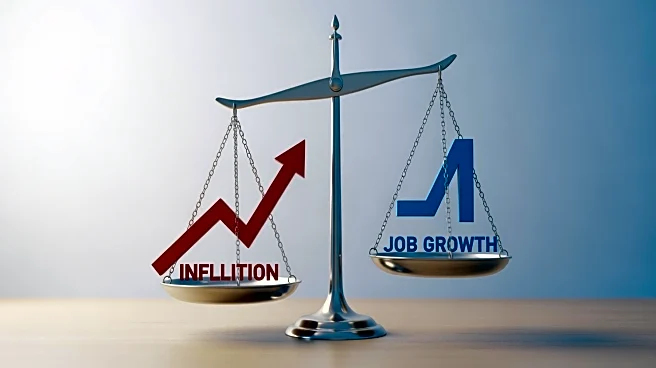What's Happening?
Recent analysis highlights the challenges facing President Trump's economic policies, particularly in light of recent election results and economic indicators. The commentary suggests that Trump's tariffs
and anti-China policies, along with the extension of 2017 tax cuts and deregulation efforts, have contributed to economic uncertainty. Inflation rates have risen, with the consumer price index increasing to 3.0% in September, and job growth has slowed, as evidenced by private sector hiring reports. Additionally, farm bankruptcies have increased, and consumer spending growth has declined. These developments have led to a negative perception of Trump's handling of the economy, as reflected in opinion polls and consumer sentiment indices.
Why It's Important?
The economic policies under President Trump have significant implications for various sectors and stakeholders in the U.S. The rising inflation and slowing job growth could impact consumer purchasing power and overall economic stability. Businesses face planning challenges due to the uncertainty created by tariffs and other policy decisions. The agricultural sector is particularly affected, with increased bankruptcies and reduced demand for American produce. These economic conditions could influence public opinion and political dynamics, as seen in recent election outcomes. The administration's approach to tariffs and immigration policies may further exacerbate economic challenges, affecting both domestic and international trade relations.
What's Next?
The continuation of current economic policies may lead to further economic uncertainty and potential challenges for businesses and consumers. The government shutdown and tariff-related inflation are expected to persist, impacting various sectors. The administration may need to reconsider its policies in response to public sentiment and economic indicators. Stakeholders, including political leaders and business executives, may push for changes to address these issues. The upcoming confirmation of nominees and legislative actions could also influence the direction of economic policy and its impact on the U.S. economy.
Beyond the Headlines
The broader implications of President Trump's economic policies extend beyond immediate economic indicators. The legal challenges surrounding tariffs and immigration policies highlight potential ethical and legal concerns. The administration's approach to economic management may lead to long-term shifts in trade relations and domestic policy priorities. The focus on tariffs and deregulation could reshape the U.S. economic landscape, affecting industries and consumer behavior. These developments may also influence future political strategies and electoral outcomes, as economic conditions remain a key factor in voter decision-making.









